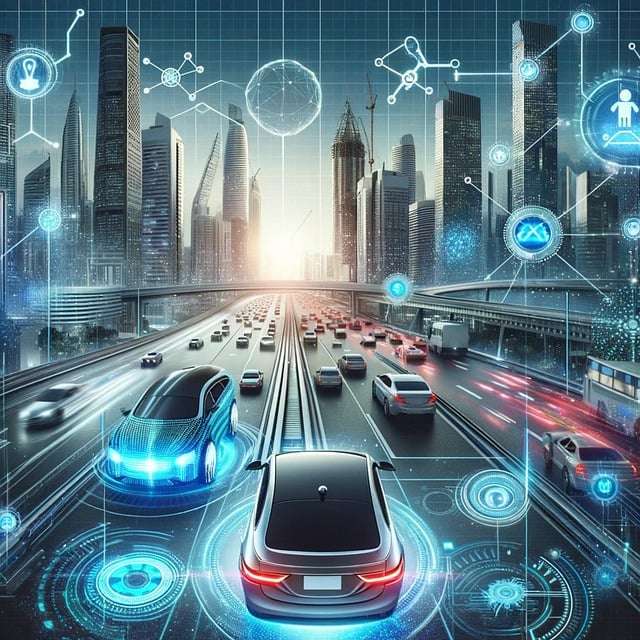Electrifying the Road

The advent of electric vehicles (EVs) signals a transformative era in transportation. Advancements in battery technology and charging infrastructure are propelling EVs into the mainstream, offering cleaner and quieter alternatives to traditional fossil fuel-powered vehicles. From stylish electric cars to eco-conscious public transit solutions, the future of travel is becoming increasingly electrified.
Autonomous Journey

Towards Driverless Travel: Autonomous vehicles (AVs) are reshaping the landscape of transportation, powered by artificial intelligence and sophisticated sensors. Capable of navigating roads with minimal human intervention, AVs hold the promise of safer and more efficient travel experiences. Beyond personal vehicles, autonomous technology is poised to revolutionize logistics, public transit, and urban planning.
Fusion of Electric and Autonomous Technologies

The convergence of electric and autonomous innovations represents a monumental shift in transportation paradigms. Electric AVs not only reduce carbon emissions but also offer improved efficiency and reliability. Moreover, the integration of renewable energy sources with autonomous fleets holds potential for creating sustainable transportation ecosystems, fostering smarter and greener cities.
Charting a Course for a Sustainable Tomorrow

While the future of transportation holds immense promise, overcoming challenges such as infrastructure development and regulatory hurdles is paramount. Additionally, ensuring societal acceptance and addressing concerns about data privacy and cybersecurity are critical. By collaborating across industries and prioritizing sustainability, we can navigate towards a future where transportation is not only convenient and efficient but also environmentally friendly.
Autonomous Journey.
Towards Driverless Travel
Autonomous vehicles (AVs) are reshaping the landscape of transportation, powered by artificial intelligence and sophisticated sensors. Capable of navigating roads with minimal human intervention, AVs hold the promise of safer and more efficient travel experiences. Beyond personal vehicles, autonomous technology is poised to revolutionize logistics, public transit, and urban planning.
The Role of Artificial Intelligence
Artificial intelligence (AI) plays a central role in enabling autonomous vehicles to perceive their surroundings, make decisions, and navigate complex environments. Machine learning algorithms analyze vast amounts of sensor data, including LiDAR, radar, and cameras, to detect and respond to obstacles, pedestrians, and other vehicles in real-time. As AI continues to advance, autonomous vehicles will become increasingly capable and reliable, paving the way for widespread adoption and integration into everyday transportation systems.
Regulatory Frameworks and Safety Standards
The deployment of autonomous vehicles requires the development of robust regulatory frameworks and safety standards to ensure public trust and confidence. Governments and regulatory agencies are working closely with industry stakeholders to establish guidelines for testing, certification, and operation of autonomous vehicles. Safety remains a top priority, with rigorous testing protocols and simulations used to assess the performance and reliability of autonomous systems in various driving conditions. By establishing clear rules and standards, policymakers can facilitate the safe and responsible integration of autonomous vehicles into society.
Fusion of Electric and Autonomous Technologies.
The Convergence of Electric and Autonomous Innovations
The convergence of electric and autonomous innovations represents a monumental shift in transportation paradigms. Electric AVs not only reduce carbon emissions but also offer improved efficiency and reliability. Moreover, the integration of renewable energy sources with autonomous fleets holds potential for creating sustainable transportation ecosystems, fostering smarter and greener cities.
Synergies for Sustainable Mobility
The combination of electric and autonomous technologies unlocks synergies that enhance the sustainability and efficiency of transportation systems. Electric AVs powered by renewable energy sources offer a compelling solution for reducing greenhouse gas emissions and mitigating the environmental impact of transportation. Furthermore, autonomous mobility services, such as ride-sharing and on-demand transit, optimize vehicle utilization and reduce traffic congestion, leading to more efficient use of resources and infrastructure.
Charting a Course for a Sustainable Tomorrow
Overcoming Challenges and Harnessing Opportunities
While the future of transportation holds immense promise, overcoming challenges such as infrastructure development and regulatory hurdles is paramount. Additionally, ensuring societal acceptance and addressing concerns about data privacy and cybersecurity are critical. By collaborating across industries and prioritizing sustainability, we can navigate towards a future where transportation is not only convenient and efficient but also environmentally friendly.
Investing in Sustainable Infrastructure
Investments in sustainable infrastructure are essential for supporting the transition to electric and autonomous transportation systems. This includes expanding public transit networks, building charging infrastructure, and upgrading roads and highways to accommodate autonomous vehicles. Additionally, investments in renewable energy sources, such as solar and wind power, are crucial for powering electric vehicles and reducing reliance on fossil fuels.
Promoting Multimodal Connectivity
Promoting multimodal connectivity is key to creating a seamless and integrated transportation system that meets the diverse needs of travelers. By connecting different modes of transportation, such as buses, trains, bicycles, and shared mobility services, cities can reduce reliance on single-occupancy vehicles and encourage more sustainable travel behavior. Integrated mobility platforms and digital tools can help travelers plan their journeys efficiently and access a range of transportation options, contributing to reduced congestion and emissions in urban areas.
Embracing Innovation and Collaboration
Embracing innovation and collaboration is essential for driving progress towards sustainable transportation solutions. Public-private partnerships, research collaborations, and cross-sector initiatives can facilitate the development and deployment of cutting-edge technologies and practices that enhance the sustainability and resilience of transportation systems. By harnessing the collective expertise and resources of governments, businesses, and civil society, we can accelerate the transition to a cleaner, smarter, and more equitable transportation future.
Societal Acceptance and Ethical Considerations
Societal acceptance of electric and autonomous technologies is crucial for their widespread adoption and success. Educating the public about the benefits of electric vehicles and autonomous vehicles, such as reduced emissions, improved safety, and enhanced mobility, can help dispel myths and misconceptions. Additionally, addressing ethical considerations, such as job displacement in the transportation sector and the ethical implications of autonomous vehicle decision-making, requires thoughtful dialogue and collaboration among stakeholders. By engaging communities and fostering transparency, policymakers and industry leaders can build trust and support for the transition to a more sustainable and equitable transportation system.
Data Privacy and Cybersecurity Concerns
As transportation becomes increasingly connected and automated, safeguarding data privacy and cybersecurity is paramount. Electric vehicles and autonomous vehicles rely on extensive data collection and communication systems to operate effectively, raising concerns about the protection of sensitive information and the potential for cyberattacks. Robust cybersecurity measures, including encryption, authentication, and intrusion detection systems, are essential for safeguarding vehicle systems and infrastructure from malicious actors. Additionally, clear data privacy policies and regulations are needed to ensure that consumer data is collected, stored, and shared responsibly and transparently.
Equitable Access and Social Justice
Ensuring equitable access to electric and autonomous transportation is essential for addressing social disparities and promoting inclusive economic development. Low-income and marginalized communities often face barriers to accessing clean and efficient transportation options, such as limited public transit service and lack of charging infrastructure in underserved areas. By prioritizing investment in transportation infrastructure and services in disadvantaged communities, policymakers can promote social equity and reduce transportation-related disparities. Additionally, targeted incentives and subsidies can help make electric vehicles and autonomous vehicles more affordable and accessible to low-income individuals and families.
Educating the Public and Stakeholder Engagement
Educating the public about the benefits and challenges of electric and autonomous transportation is critical for fostering informed decision-making and public support. Outreach initiatives, educational campaigns, and community workshops can help raise awareness about the environmental, economic, and social implications of transitioning to electric and autonomous vehicles. Additionally, engaging stakeholders, including policymakers, industry representatives, environmental advocates, and community leaders, in dialogue and decision-making processes can facilitate collaboration and consensus-building around transportation policy and planning initiatives. By fostering a culture of engagement and participation, we can ensure that transportation systems are designed and implemented to meet the needs and preferences of all stakeholders.
Economic Implications and Market Dynamics
The transition to electric and autonomous transportation has significant economic implications and is reshaping global markets and industries. Electric vehicle manufacturing and supply chains are experiencing rapid growth and investment, creating new opportunities for job creation and economic development. Similarly, the emergence of autonomous mobility services is disrupting traditional transportation models and creating new markets for technology and services. However, the transition also poses challenges for traditional automotive manufacturers, suppliers, and workers, requiring adaptation and innovation to remain competitive in a rapidly evolving landscape. By supporting workforce development, fostering innovation, and promoting entrepreneurship, policymakers can ensure that the economic benefits of the transition to electric and autonomous transportation are shared equitably and sustainably.
International Cooperation and Policy Harmonization
Addressing the complex challenges of electric and autonomous transportation requires international cooperation and policy harmonization. Global standards and regulations for vehicle safety, emissions, and cybersecurity can facilitate market access and promote interoperability of electric and autonomous vehicles across borders. Additionally, collaborative research and development initiatives can accelerate innovation and technology transfer, driving progress towards common goals such as reducing greenhouse gas emissions and improving road safety. By working together, countries can leverage their collective expertise and resources to address shared challenges and seize opportunities for sustainable and inclusive transportation development on a global scale.
Resilience and Adaptation Strategies
Building resilience into electric and autonomous transportation systems is essential for mitigating risks and adapting to changing environmental, social, and technological conditions. Climate change, natural disasters, and geopolitical instability can disrupt transportation networks and infrastructure, highlighting the need for resilient design and planning. Strategies such as decentralized charging infrastructure, vehicle-to-grid integration, and disaster preparedness measures can enhance the resilience of electric and autonomous transportation systems, ensuring continuity of service and minimizing disruptions in the face of unforeseen events. By prioritizing resilience and adaptation, policymakers and industry stakeholders can future-proof transportation systems and enhance their ability to withstand and recover from shocks and stresses.
Monitoring and Evaluation of Sustainability Metrics
Monitoring and evaluating the sustainability performance of electric and autonomous transportation systems is essential for tracking progress towards environmental, social, and economic goals. Key performance indicators such as greenhouse gas emissions, energy efficiency, equity, and accessibility can provide insights into the effectiveness of policy interventions and infrastructure investments. By collecting and analyzing data on transportation patterns, mode choice, and vehicle usage, policymakers can identify opportunities for improvement and optimize resource allocation to maximize sustainability outcomes. Additionally, stakeholder engagement and transparency in reporting can enhance accountability and foster trust in the sustainability of transportation initiatives.
Future Outlook and Trends
The future of electric and autonomous transportation is filled with promise and potential, driven by ongoing technological innovation, policy support, and shifting consumer preferences. Electric vehicles are expected to continue gaining market share as battery costs decline, driving range increases, and charging infrastructure expands. Similarly, autonomous vehicles are poised to become increasingly integrated into transportation systems, offering safer, more efficient, and more accessible mobility solutions. Trends such as electrification, automation, connectivity, and shared mobility are reshaping the transportation landscape and paving the way for a more sustainable and equitable future. By embracing these trends and proactively addressing challenges, we can accelerate the transition to electric and autonomous transportation systems that enhance quality of life, promote economic prosperity, and safeguard the planet for future generations.






